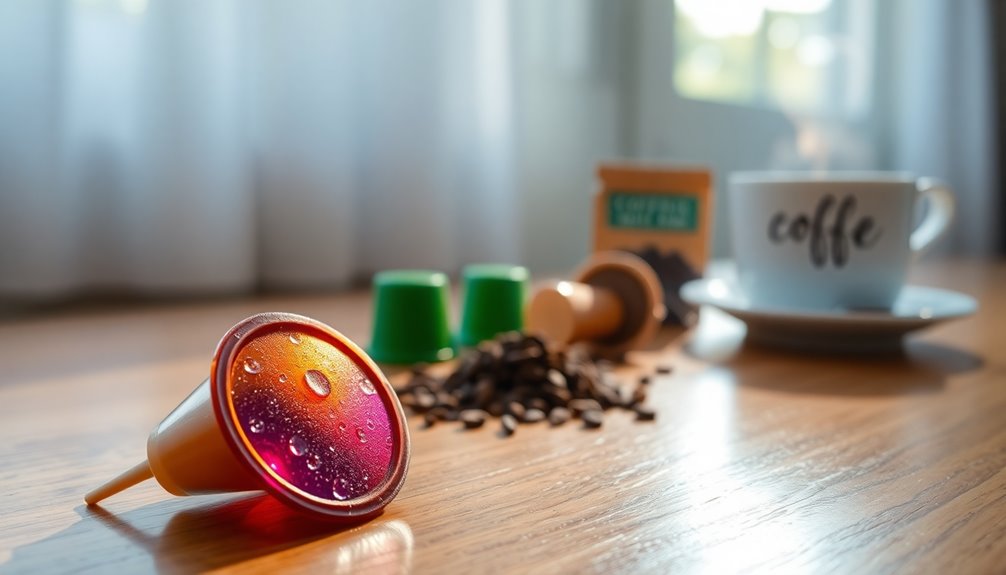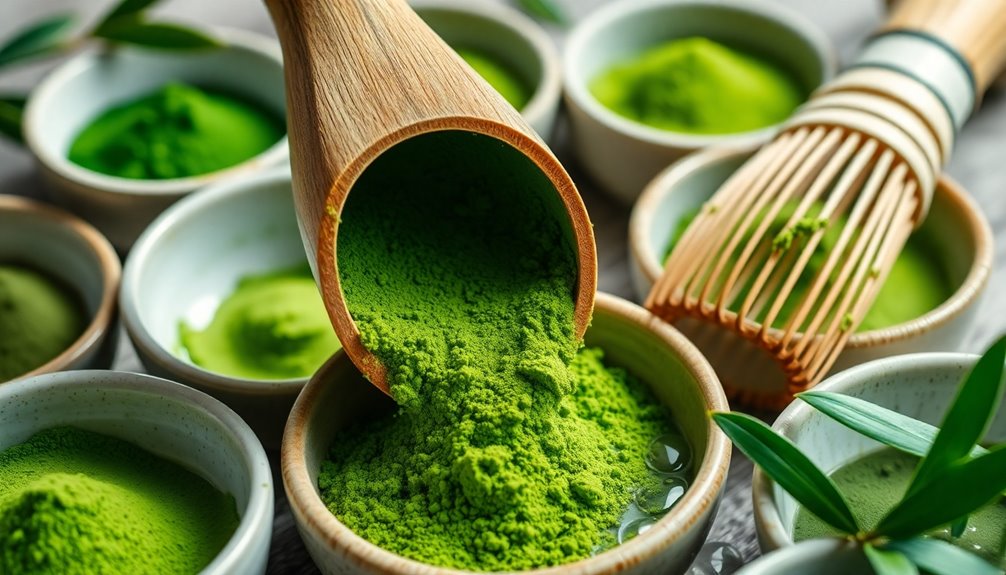Single-serve coffee pods can pose several health risks, including chemical leaching, especially BPA, which disrupts hormones and may lead to fertility issues. Caffeine sensitivity can cause digestive discomfort, while unclean machines harbor harmful mold and bacteria. The environmental impact is significant, as these pods create massive landfill waste. To mitigate these risks, consider using reusable or biodegradable pods, verify your machine is regularly cleaned, and monitor your caffeine intake. Choosing safer brewing methods can also help protect your health and the planet. Discovering more effective strategies can truly enhance your coffee experience. Moreover, it’s important to be mindful of coffee’s impact on digestion, as excessive consumption can lead to issues like acid reflux or upset stomachs for some individuals. Experimenting with different brewing techniques, such as cold brew or using high-quality whole beans, can yield a smoother taste and potentially lessen harsh effects on the digestive system. Ultimately, being proactive in your coffee choices not only elevates your morning routine but also aligns with a healthier lifestyle.
Key Takeaways
- Single-serve coffee pods made from #7 plastic can leach harmful chemicals like BPA, leading to hormonal disruption and fertility issues; consider stainless steel or biodegradable alternatives.
- Regular exposure to BPA from coffee pods is linked to long-term health risks, including increased cancer risk; minimize plastic exposure to safeguard health.
- Coffee machines can harbor mold and bacteria if not cleaned regularly; maintain hygiene by descaling machines every 1-3 months and using a vinegar solution for disinfection.
- Caffeine sensitivity from single-serve coffee pods may cause digestive discomfort; monitor reactions and explore alternative brewing methods like cold brew to support digestive health.
- The environmental impact of non-biodegradable coffee pods is significant; opt for reusable pods or brands with sustainable disposal options to reduce landfill waste.
Chemical Leaching From Pods

While you may enjoy the convenience of single-serve coffee pods, it's important to be aware of the potential health risks associated with them, particularly chemical leaching.
Many plastic pods, often made from #7 plastic, can release harmful chemicals like BPA and phthalates into your coffee when exposed to high temperatures. This chemical leaching raises significant health concerns, as studies suggest that coffee brewed from these pods may exhibit estrogenic activity, potentially disrupting your hormonal balance.
Continuous consumption of these chemicals could lead to reproductive issues and other long-term health problems.
To mitigate these risks, consider switching to reusable stainless steel coffee pods, which eliminate the danger of chemical leaching and offer a safer option for your daily brew.
BPA Exposure Risks
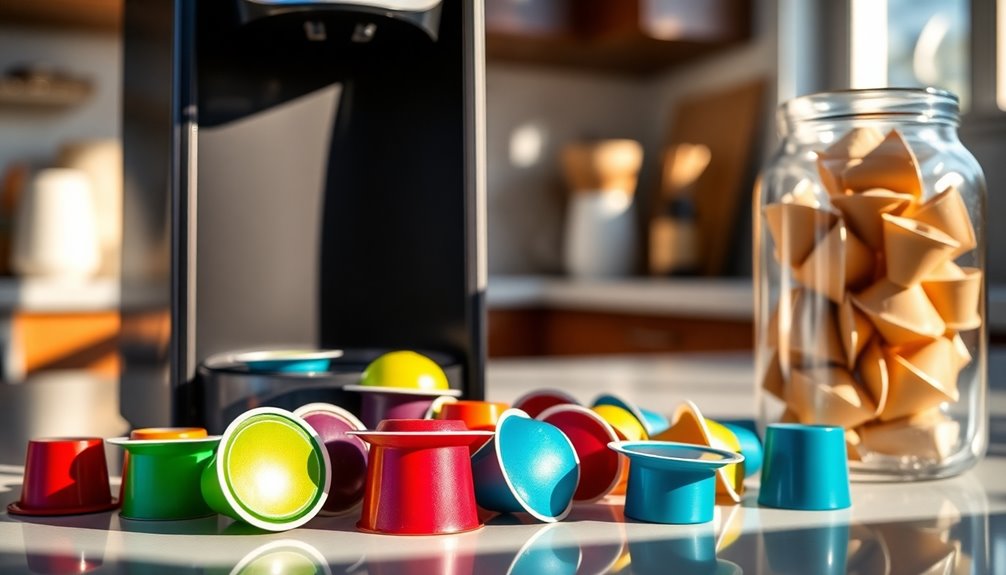
When you brew coffee using single-serve pods, you might be exposing yourself to BPA, a chemical that can disrupt your hormones.
This exposure has been linked to fertility issues and reproductive problems, raising serious concerns about long-term health effects.
Choosing safer alternatives, like stainless steel or biodegradable pods, can help reduce these risks.
Hormonal Disruption Effects
As you sip your morning coffee brewed from single-serve pods, you might not realize that these convenient products can pose significant health risks due to BPA exposure. BPA, often found in #7 plastic pods, has been linked to hormonal disruptions and may leach into hot beverages. Research shows that even low doses can mimic estrogen, leading to potential long-term health effects.
| Concern | Impact |
|---|---|
| BPA Presence | Hormonal disruptions |
| Estrogenic Chemicals | Increased health risks |
| Cumulative Exposure | Long-term hormonal imbalances |
| Alternatives | Reusable pods, biodegradable options |
To mitigate risks, consider using reusable stainless steel coffee pods that don't contain BPA and other harmful substances.
Fertility and Reproductive Issues
Exposure to bisphenol A (BPA) from single-serve coffee pods can considerably impact your fertility and reproductive health.
Studies show that BPA, commonly found in the plastic of these pods, may disrupt hormonal functions, leading to fertility problems like polycystic ovary syndrome (PCOS) and infertility in both men and women.
Regularly consuming coffee brewed from plastic pods raises concerns due to the leaching of BPA, especially at high temperatures. This low-dose exposure is linked to decreased sperm quality and altered menstrual cycles.
To protect your reproductive health, it's essential to monitor and minimize your exposure to plastic. Switching to BPA-free options or alternative brewing methods can help mitigate these risks and support your overall well-being.
Long-term Health Implications
Although many enjoy the convenience of single-serve coffee pods, the long-term health implications of BPA exposure warrant serious consideration.
Prolonged use of #7 plastic pods can lead to hormone disruption and reproductive health issues, increasing the risk of certain cancers. Even low-dose BPA exposure may interfere with your endocrine function, potentially resulting in conditions like polycystic ovary syndrome (PCOS) and fertility challenges.
Studies reveal that BPA can leach into hot beverages, especially when brewed with plastic pods. The World Health Organization has flagged BPA as a substance of concern, particularly for vulnerable populations.
To mitigate BPA exposure risks, consider switching to reusable coffee pods made from stainless steel or BPA-free materials, eliminating the need for harmful single-use pods.
Aluminum and Neurological Concerns
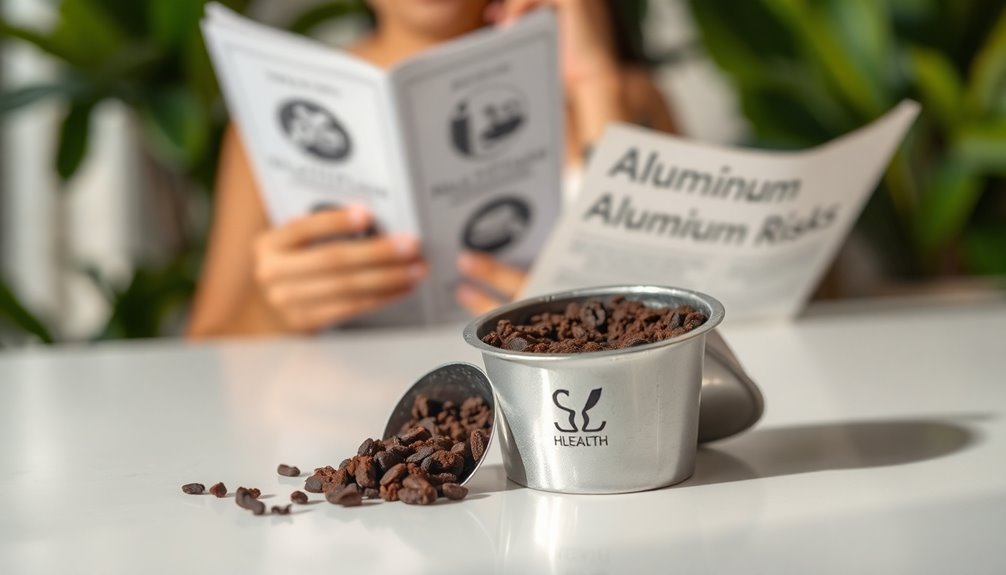
While many enjoy the convenience of single-serve coffee pods, the aluminum components used in these products raise significant neurological concerns.
Long-term exposure to aluminum has been linked to neurological disorders, including Alzheimer's disease. Studies show aluminum can accumulate in the brain, and the heating process during brewing may increase leaching into your coffee, raising the risk of neurotoxic effects.
The World Health Organization classifies aluminum as a possible human neurotoxin, urging caution in its use for food and beverages.
To mitigate these risks, consider alternatives like stainless steel or biodegradable coffee pods. By making informed choices, you can enjoy your coffee while minimizing potential health hazards associated with aluminum exposure.
Caffeine Overconsumption Issues
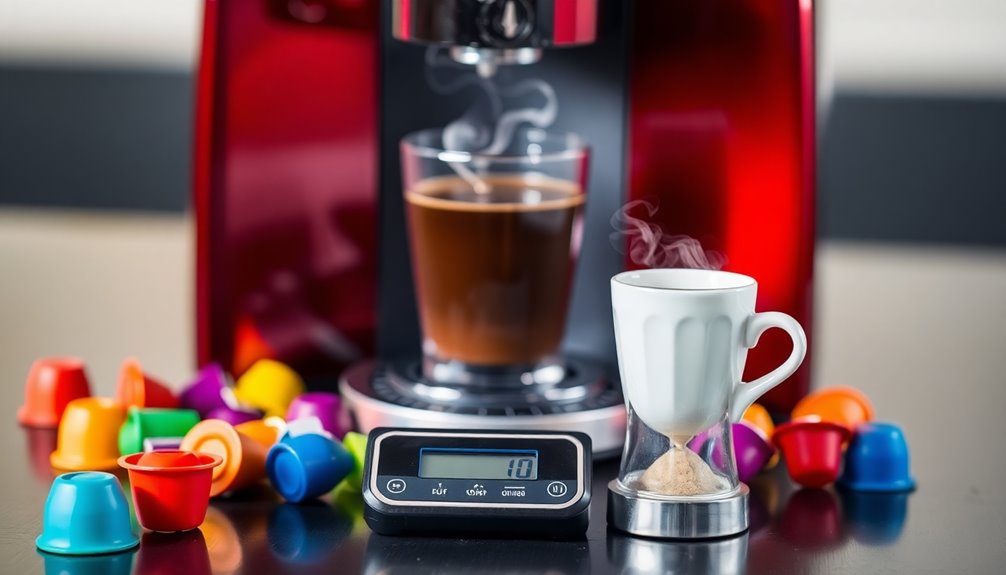
As aluminum concerns linger, another issue arises with single-serve coffee pods: caffeine overconsumption. Many of these pods contain 8-12 grams of coffee, leading to higher caffeine intake than you might expect.
With some pods packing up to 200 mg of caffeine, it's easy to exceed the recommended maximum of 400 mg per day, especially if you're consuming multiple servings. Caffeine overconsumption can trigger health issues like insomnia, increased heart rate, and anxiety.
You need to be vigilant by monitoring caffeine from all sources, including medications and energy drinks. To mitigate these risks, consider choosing lower-caffeine coffee pods, limiting yourself to a few cups a day, or swapping in decaffeinated options to keep your caffeine intake in check. Additionally, be aware that caffeine overconsumption can also lead to dehydration, which may further exacerbate health problems.
Mold Growth in Coffee Machines
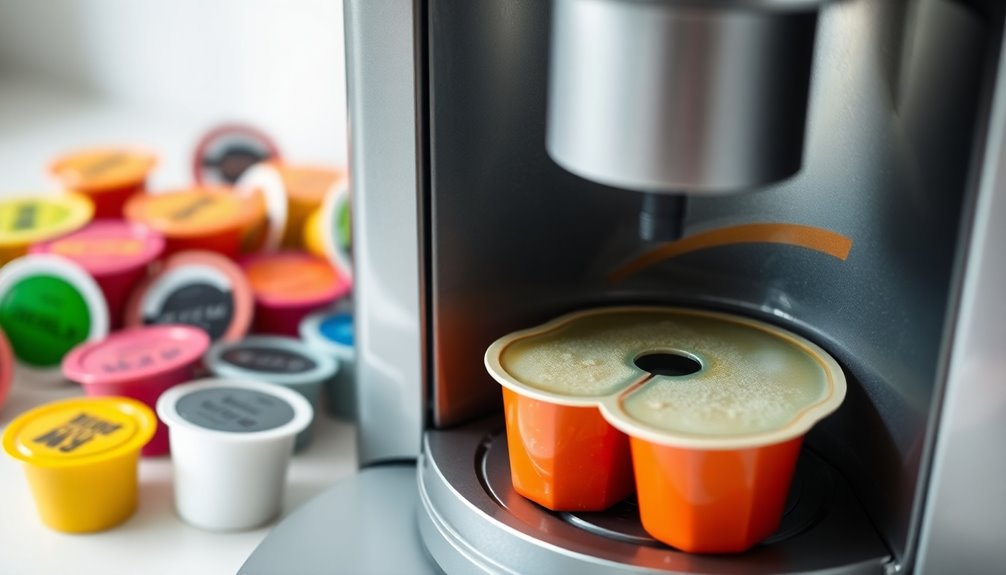
If you own a single-serve coffee machine, you mightn't realize that moisture can lead to mold growth inside.
This not only poses health risks but also affects the taste of your coffee.
To keep your machine safe and your coffee enjoyable, it's essential to practice preventive maintenance regularly.
Causes of Mold Growth
Mold growth in coffee machines arises primarily from the damp and warm conditions created during the brewing process, especially when the machine isn't cleaned regularly.
Leftover coffee grounds and stagnant water in the reservoir can foster an ideal environment for bacteria and mold. If you don't empty and clean your coffee machine frequently, you risk contamination; studies show that some machines can harbor mold and bacteria at contamination rates of 50% or more.
Regular cleaning of components like the water reservoir and drip trays is essential. Additionally, using filtered or distilled water can help prevent mineral buildup, reducing the chances of mold growth and ensuring a cleaner cup of coffee.
Prioritize maintenance to enjoy healthier brews!
Health Risks Involved
While enjoying your morning coffee, you mightn't realize that neglecting proper maintenance of your coffee machine can pose significant health risks.
Coffee machines, especially those using coffee pods, can become breeding grounds for mold due to leftover water and coffee residue. A study from the University of California highlights that uncleaned machines can harbor mold and bacteria, leading to potential respiratory issues and infections.
Not only does mold threaten your health, but it can also affect the taste of your coffee, leaving you with off-flavors that ruin your experience.
To avoid these potential health risks, it's crucial to establish a regular cleaning routine, ensuring you empty and dry your machine after each use and perform thorough cleaning monthly.
Preventive Maintenance Practices
To prevent the growth of mold in your coffee machine, establishing effective maintenance practices is crucial. Regularly clean and descale your machine every 1 to 3 months, and always empty and wash the water reservoir to eliminate stagnant water. Use a mixture of equal parts vinegar and water for cleaning, as it effectively combats mold and bacteria. After brewing, let your machine dry completely by leaving the lid open and removing used pods. Don't forget to inspect and replace water filters regularly, as old filters can be a source of mold and bacteria.
| Action | Frequency | Purpose |
|---|---|---|
| Clean & Descales | Every 1-3 months | Reduces mold and bacteria |
| Empty Water Reservoir | After each use | Prevents stagnant water |
| Use Vinegar Mix | Monthly | Disinfects machine components |
| Replace Water Filters | As needed | Guarantees clean water supply |
Hormonal Disruption Potential
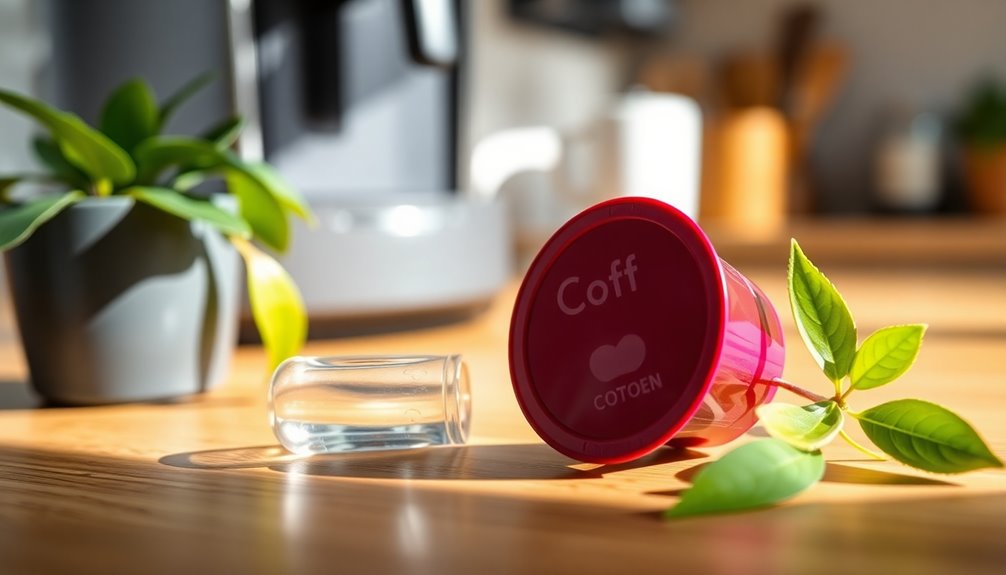
As you enjoy your morning coffee from a single-serve pod, you mightn't realize that the convenience comes with potential health risks, particularly concerning hormonal disruption.
Many single-serve coffee pods are made from #7 plastic, which can leach bisphenol A (BPA) and phthalates into your brew. Research shows that brewing at high temperatures and pressures may cause estrogenic chemicals to migrate into your coffee, leading to hormonal disruptions in your body.
Consistent exposure to these chemicals can result in fertility problems and hormonal imbalances. To mitigate these health implications, consider switching to BPA-free plastic or using reusable stainless steel coffee pods.
Choosing biodegradable alternatives can also help reduce your exposure to these harmful substances. Additionally, adopting eco-friendly practices in your daily routine can contribute to overall health and well-being.
Digestive Discomfort Factors
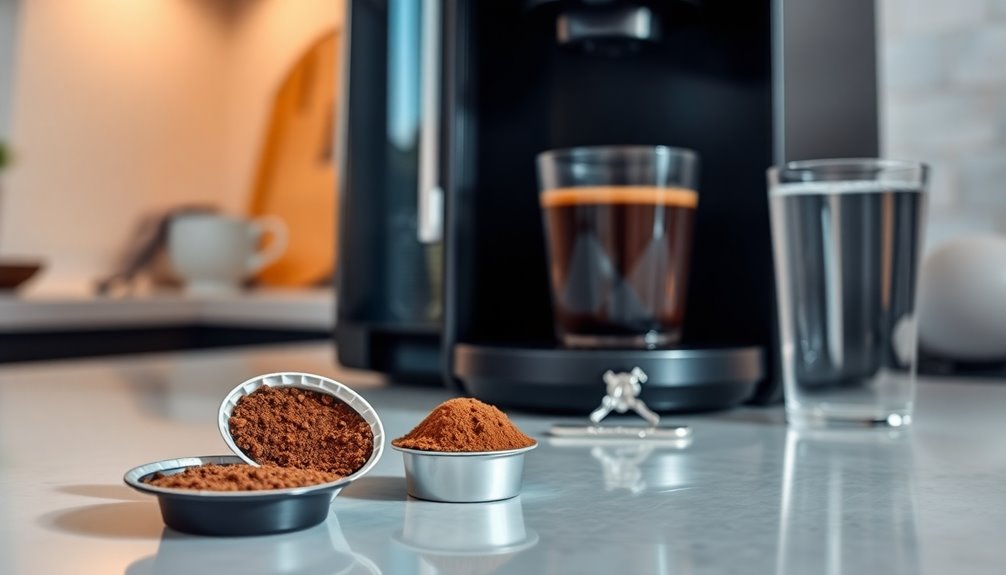
If you're sensitive to caffeine, using single-serve coffee pods might lead to digestive discomfort, like acid reflux or stomach upset.
Additionally, concerns about chemical leaching from the pods could further irritate your gastrointestinal tract.
It’s important to pay attention to how your body reacts and consider adjusting your coffee choices accordingly. For some people, high caffeine content in regular coffee can lead to jitters, anxiety, or disrupted sleep. If you find yourself experiencing these symptoms, you may want to consider switching to a lower caffeine option such as decaf or a lighter roast. Another alternative is to try cold brew coffee, which typically has lower cold brew caffeine content and can be easier on your system. It’s also important to remember that everyone’s tolerance to caffeine is different, so it’s ultimately about finding what works best for you and your body.
Caffeine Sensitivity Issues
While many enjoy the convenience of single-serve coffee pods, those with caffeine sensitivity often face uncomfortable digestive issues. The significant caffeine content in these pods can trigger symptoms like:
- Acid reflux or heartburn due to high caffeine levels.
- Increased anxiety or restlessness after consumption.
- Exacerbation of gastrointestinal issues, such as irritable bowel syndrome.
- Digestive discomfort even with moderate intake.
To mitigate these health effects, it's essential to monitor your caffeine tolerance. Consider alternative brewing methods, like cold brew or low-acid coffee, which can be gentler on your system. By adjusting your brewing process and being mindful of your caffeine sensitivity, you can still enjoy your coffee without the unpleasant side effects. Additionally, understanding the importance of hydration and nutrition can further support your digestive health.
Chemical Leaching Concerns
Caffeine sensitivity isn't the only concern when it comes to single-serve coffee pods; chemical leaching from the pod materials can also pose risks to your health.
The #7 plastic used in these pods may contain BPA and phthalates, which can migrate into your brewed coffee, especially under high temperatures. This chemical leaching raises alarms about hormone disruption and digestive discomfort, such as bloating.
While you might enjoy the convenience and potential health benefits of single-serve coffee, it's essential to monitor your body's response. If you experience digestive issues, consider reducing your intake or switching to alternative brewing methods. Additionally, think about the environmental impacts of these plastic pods, as they contribute to waste and toxicity concerns.
Incorporating healthier alternatives like traditional brewing methods can help mitigate these risks while still allowing you to enjoy your coffee.
Environmental Impact of Waste
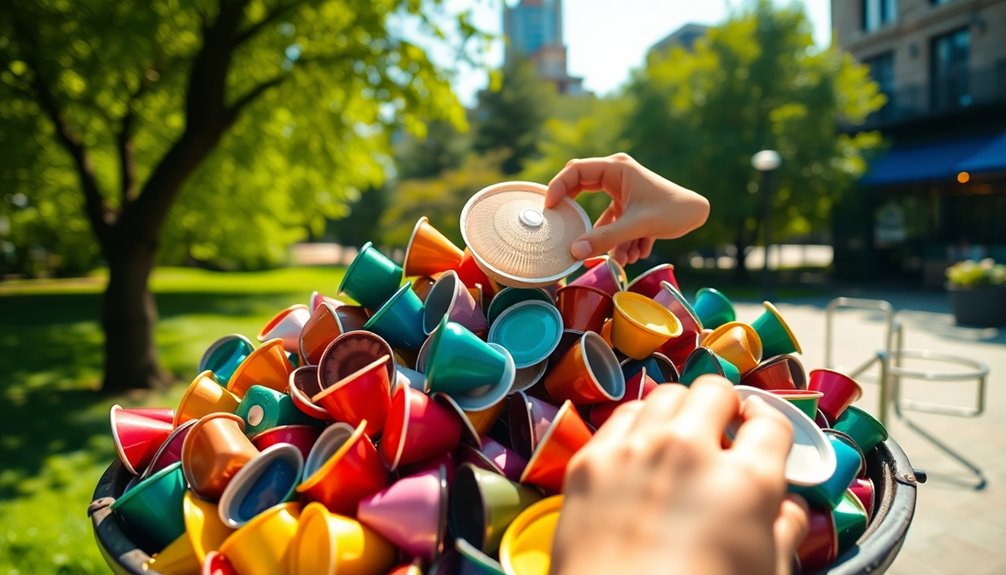
As single-serve coffee pods continue to grow in popularity, their environmental impact becomes increasingly concerning. You mightn't realize that:
- Approximately 39,000 coffee pods are generated worldwide every minute.
- Most pods are made from non-biodegradable materials, leading to billions ending up in landfills annually.
- The complex recycling process results in low recycling rates, increasing their carbon footprint.
- Small pod sizes complicate recycling efforts, causing many to fall through sorting grates.
To combat these issues, consider opting for brands that prioritize sustainable disposal methods or participate in recycling programs like TerraCycle.
Quality Control in Brewing
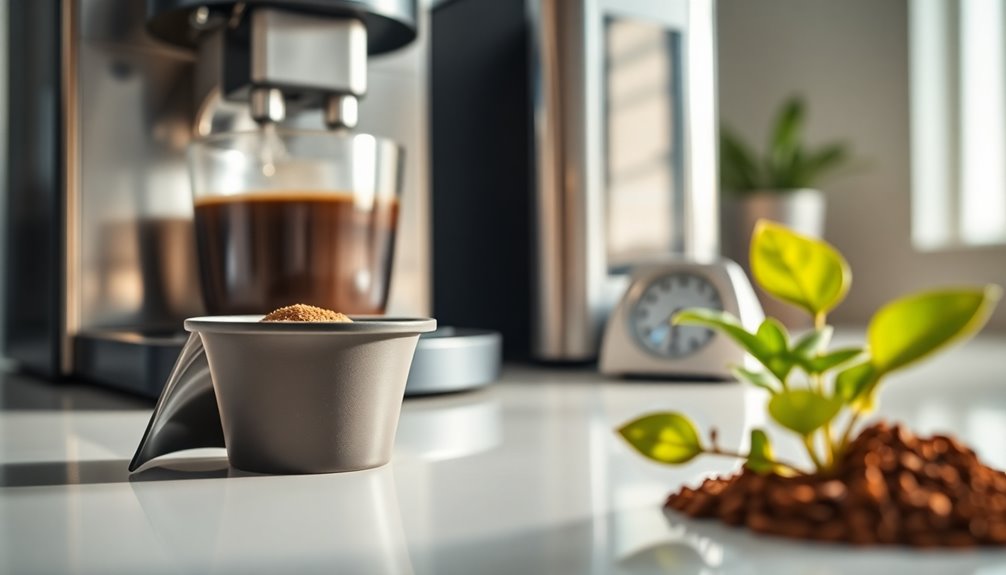
The rising popularity of single-serve coffee pods not only raises environmental concerns but also highlights the importance of quality control in brewing.
The rapid brewing process can lead to inconsistent extraction, affecting the quality of the coffee you enjoy. This inconsistency may result in a less rich flavor and lower antioxidant levels compared to traditional methods.
Additionally, chemical leaching from pod materials poses health risks, particularly with estrogenic chemicals that can migrate during brewing.
To address these issues, implementing stringent quality control measures, including regular testing of materials and evaluating brewing performance, is essential.
Alternatives to Single-Serve Pods

If you're looking for healthier and more eco-friendly options, several alternatives to single-serve coffee pods can elevate your brewing experience.
Consider these choices:
- Reusable stainless steel coffee pods – They reduce waste and eliminate exposure to harmful chemicals found in plastic pods.
- Biodegradable coffee pods – Made from paper or plant-based materials, these decompose easily, minimizing your environmental impact.
- Coffee bags – A sustainable brewing option that's fully compostable, offering rich flavors without single-use plastics.
- Pour-over or French press – These methods utilize compostable filters, enhancing flavor and health benefits, especially with low-acid organic coffee options that promote digestive health.
Additionally, incorporating herbal teas into your routine can provide various health benefits and enhance your overall well-being.
Make the switch today for a better brew!
Frequently Asked Questions
What Is the Health Risk of Coffee Pods?
When you use coffee pods, you're exposing yourself to potential health risks.
Many of these pods are made from plastics that can leach harmful chemicals into your brew, especially under high temperatures. This leaching could disrupt your hormones and affect reproductive health.
If you enjoy single-serve coffee, you might want to explore alternatives that limit these risks, like switching to stainless steel pods, which won't leach harmful substances into your drink.
What Are the Disadvantages of Single Serving Coffee Pods or Discs?
Imagine savoring a perfectly brewed cup of coffee, only to discover it's been brewed in a plastic cup.
That's what single-serve coffee pods offer you: convenience at a cost. They often produce less flavorful coffee and contribute considerably to environmental waste.
Plus, their complex materials make recycling tough, leading to more trash.
What Is the Problem With Coffee Pods?
The problem with coffee pods is their convenience comes at a cost. You might enjoy the ease of brewing a quick cup, but those single-use pods create a massive amount of plastic waste that clutters our environment.
Plus, many pods contain materials that could leach harmful chemicals into your coffee. Over time, this could lead to health concerns, making you rethink your coffee choices in favor of more sustainable options.
Does the Aluminium From Coffee Pods Leach Into the Coffee?
Imagine savoring your morning coffee, only to learn that aluminum might leach into your brew.
Yes, studies suggest that aluminum from coffee pods can seep into your drink, especially at high temperatures. This leaching occurs more with single-serve pods due to their brewing method.
While it might be convenient, you need to reflect on if that convenience is worth the potential risks.
Staying informed helps you make choices that keep your coffee experience safe and enjoyable.
Conclusion
You might think single-serve coffee pods are just a convenient treat, but they come with hidden risks that could affect your health and the environment. By being aware of issues like chemical leaching and caffeine overconsumption, you can make smarter choices. Consider alternatives like reusable pods or traditional brewing methods to enjoy your coffee without the downsides. Taking a little extra time now can lead to a healthier cup and a happier planet in the long run.
